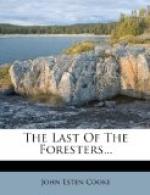“No, I thank you,” said Mr. Jinks, drawing back; “I have business, sir—important business, sir!”
“Have you?” said Ralph, restraining his desire to lay the lash of his whip over Fodder’s back, and so inaugurate a new Iliad of woes for Mr. Jinks. “Then go on in your course, my dear fellow. I am going to see a young lady, who really is beginning to annoy me.”
And the mercurial young fellow passed from laughter to smiles, and even to something suspiciously resembling a sigh.
“Farewell, my dear Jinks,” he added, becoming gay again; “fortune favors the brave, recollect. I wish I could believe it,” he added, laughing.
And touching his horse, Ralph set forward toward the Bower of Nature, and consequently toward Miss Fanny.
“There goes a young man who is in love,” said Mr. Jinks, with philosophic dignity; “regularly caught by a pair of black eyes. Boy!” added Mr. Jinks, after the manner of Coriolanus, “he don’t know ’em as I do. He’s looking out for happiness—I for revenge!”
And Mr. Jinks scowled at a stable-boy until the terrified urchin hung his head in awe, respect, and admiration. The great militaire was not superior to humanity, and even this triumph elated him. He set forth, therefore, on Fodder, feeling like a conqueror.
If this veracious history were a narrative of the life and adventures of Mr. Jinks alone, we might follow the great conspirator in his various movements on this eventful day. We might show how he perambulated the town of Winchester on his noble steed, like a second Don Quixote, mounted for the nonce upon the courser of Sancho Panza, while Rosinante recovered from his bruises. Though the illustration might fail if carried further, inasmuch as Mr. Jinks encountered no windmills, and indeed met with no adventures worth relating, still we might speak of his prying inquisition into every movement of the hostile Irish—detail his smiling visits, in the character of spy, to numerous domicils, and relate at length the manner in which he procured the information which the noble knight desired. All this we might do; but is it necessary? Not always does the great historic muse fill up the flaws of story, leaving rather much to the imagination. And in the present instance, we might justly be accused of undue partiality. We are not sure that some of our kind readers might not go further still, and declare in general terms, that none of Mr. Jinks’ adventures were worth telling—Mr. Jinks himself being a personage wholly unworthy of attention.
To critics of this last description, we would say in deprecation of their strictures—Friends, the world is made up of a number of odd personages, as the animal kingdom is of singular, and not wholly pleasant creatures. Just as the scarabaeus and the ugly insect are as much a part of animated nature as the golden-winged butterfly, and humming-bird, and noble eagle, so are the classes, represented partly by our friend, as human as the greatest and the best. As the naturalist, with laborious care, defines the characteristics of the ugly insect, buzzing, and stinging, and preying on the weaker, so must the writer give a portion of his attention to the microscopic bully, braggart, and boasting coward of the human species. In the one case, it is science—in the other, art.




